Trans Employment Project
By: Mo Viviane (they/them), Associate Director of Workplace Equity & Inclusion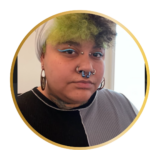
The journey of 2 Spirit, Trans, Intersex and Gender Expansive (2TIGE) folks has often been marked by courage, self-discovery, and resilience. However, it’s a journey with many challenges, particularly within employment. The lack of adequate support and affirmation in the workplace for 2TIGE people can have profound implications for our professional lives and mental health. I want to delve deeper into the intricate relationship between workplace support, mental well-being, and suicide prevention for our community.
The Struggles of 2TIGE Folks in the Workplace
As 2TIGE folks, we face unique hurdles in our professional lives. These challenges can range from subtle forms of discrimination and microaggressions to overt acts of prejudice. Many workplaces lack policies and practices that protect us from discrimination based on our gender identity. This creates an environment of fear and uncertainty, making it challenging to express our authentic selves without fear of backlash.
The absence of support and affirmation takes a toll on our mental health. We are constantly navigating hostile or unwelcoming workplaces that lead to feelings of isolation, anxiety, and depression. The stressors associated with hiding our identities or facing daily discrimination can exacerbate pre-existing mental health conditions and lead to the onset of new ones. The cumulative effect of these challenges can contribute to a heightened risk of suicidal ideation.
The Link to Suicide Prevention
Addressing the lack of support and affirmation in the workplace is crucial to suicide prevention for the 2TIGE community. Throughout my research, I have found that 2TIGE folks are at significantly higher risk for suicide attempts and completion than our cisgender counterparts. A study published in the journal JAMA Surgery reveals that gender-affirming surgeries were associated with reducing suicide risk in our community, and it also highlights the importance of affirming gender identity.
Gender affirmation goes beyond medical procedures: it extends into all aspects of life, like workplaces. A supportive environment improves mental health outcomes and acts as a protective factor against suicidal ideation. Providing your 2TIGE employees with equitable opportunities, recognizing their names and pronouns, and fostering a culture of inclusivity can make a substantial difference in their overall well-being.
Steps Towards Change
- Policy Implementation: Workplaces NEED to establish and enforce policies that explicitly prohibit discrimination based on gender identity and expression! These policies must address restroom access, dress codes, and employee benefits to ensure that 2TIGE folks are treated equitably and respectfully.
- Education & Training: Organizations need to provide education and training for employees to raise awareness of 2TIGE identities, experiences, and the importance of creating inclusive environments. It is not to be the work of your 2TIGE employees to train other folks in the workplace – this is tokenization and can be triggering for folks. Sensitivity training can help mitigate ignorance and foster empathy.
- Affirmative Practices: As an employer, you must implement practices affirming and validating gender identities and expressions. This includes using correct names and pronouns, providing gender-neutral facilities, and supporting gender transition processes (as well as including that support in your grievances policies).
- Mental Health Support: Access to mental health resources is essential. As an employer, you can collaborate with mental health professionals to provide gender-affirming counseling services tailored to your 2TIGE employees. You can also further support by offering 2TIGE folks resources such as Trans LifeLine rather than the general suicide hotline.
Creating workplaces that support and affirm our community is a human right and a fundamental step toward suicide prevention. The connection between workplace environment, mental health, and suicide risks is undeniable. Acknowledging the struggles faced by 2TIGE folks and taking proactive measures to provide safe and inclusive atmospheres at organizations and companies contribute significantly to the overall well-being of your employees while fostering a culture of acceptance and understanding.
In fostering a culture of acceptance and support for 2TIGE individuals, you can make a lasting positive impact. Trans Employment Project is an invaluable resource, offering a wealth of knowledge, guidance, and practical tools to create workplaces where every individual feels valued and respected. By getting involved with Trans Employment Project (TEmP), you’re investing in the well-being of your employees while also committing to more inclusive, diverse, and thriving workplaces.
Together, let’s take proactive steps towards a reality where everyone can excel and flourish!
Take Back the Narrative, Uncategorized
A narrative on identity and art by artist, filmmaker, and professor K Pontuti
I grew up in a small farm town in Ohio at a time where there wasn’t any language around queerness or transness—at least nothing positive. It was also a time without the internet so information wasn’t as easily available. I remember hearing phrases like “he’s really sensitive,” ”…so creative,” “…so sweet,” “…really insecure,” which later gave way to “he’s a momma’s boy,” “needs toughening up,” “has to learn what is to be a man,” “must be a queer.”
I was quite sensitive, and I could feel my difference although I didn’t quite understand it. I was also creative and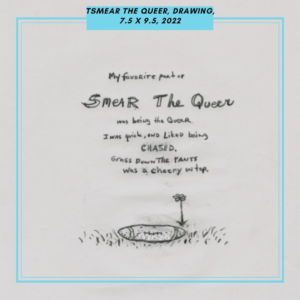 became immersed in my imagination through making things. I taught myself to draw by copying my favorite comics – Charlie Brown and Snoopy were top billed in my cast of characters – and some of my fondest childhood memories are of sewing and crafting with my mom. Soon, though, I was steered towards building model cars and airplanes…“boy stuff.” (My sisters’) Barbies were replaced with G.I. Joes.
became immersed in my imagination through making things. I taught myself to draw by copying my favorite comics – Charlie Brown and Snoopy were top billed in my cast of characters – and some of my fondest childhood memories are of sewing and crafting with my mom. Soon, though, I was steered towards building model cars and airplanes…“boy stuff.” (My sisters’) Barbies were replaced with G.I. Joes.
Like I think many do, I managed by burying it all, and through determination, desperation, and the privileges of a “straight cisgendered man,” I was able to carve out a “good life” for myself as an adult. At least for a while.
Over the years and in hindsight, I remember sensing glimpses of my yet-to-be-recognized queerness through tinglings and fuzzy feelings but mostly just moments of seeing other people living and experiencing life outside of the cisgendered binary and thinking, “Huh…” and sometimes, “That’s beautiful.”
But life’s responsibilities and gendered pathways and norms didn’t leave a lot of room for me to pose these bigger questions to myself. Even though there was an unrecognizable emptiness, anxiety, depression, and
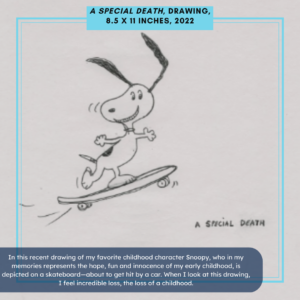 dysphoria manifesting as eating disorders, self-medication, over exercising, and an insatiable drive to prove that I was worth something, I must have known subconsciously that someday this this slimy, hairy, shitball-of-a-person inside of me would be exposed—and I’d have to come to terms with it all.
dysphoria manifesting as eating disorders, self-medication, over exercising, and an insatiable drive to prove that I was worth something, I must have known subconsciously that someday this this slimy, hairy, shitball-of-a-person inside of me would be exposed—and I’d have to come to terms with it all.
A few years ago, as I was wrapping up post production on our film, The Yellow Wallpaper (not ever imagining that I may have been the tragic story’s trapped woman), I fell into a mental health crisis that landed me in the emergency room. I was fortunate to have checked myself in, and even more fortunate to have a supportive partner and family to get me there and back. I started therapy and a long process of excavating the why’s, how’s, and now what’s of why I had forever felt this way (and, of course, this was all happening through the start of the pandemic).
I also started drawing again which was the other thing that saved me. Immersed in the simple act of putting pencil to paper, the ideas started flowing, the dexterity came back, and then it just exploded and everything poured out.
Since then, I’ve been going all in exploring my identity, trauma, and past. Making new drawings and scouring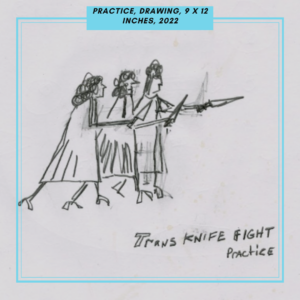 through old ones. Doing more therapy…and lots of shopping.
through old ones. Doing more therapy…and lots of shopping.
As might be expected, my artwork explores themes of gender identity, bodily autonomy, mental health, queerness, and trans rights, all from a very personal perspective. The work is very autobiographical and chronicles my transition as it unfolds, in real time.
This past September, I had my first gallery show in ages and titled it Pray And Be Thankful 4 Everything. For me it was a title that walked a line between irony and authenticity. I was so very thankful for everything, but I was also sick and tired of being told that I should be. The exhibition was amazing on so many levels; personally, professionally, and in an incredibly affirming way. I did as many presentations as I could, especially once I saw the impact it was making.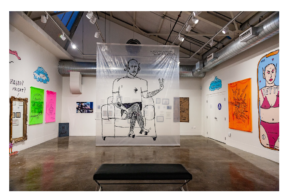
The show provided a platform to start direct conversations about important topics, but definitely raised a lot of eyebrows at the university. Through it all, I’ve received many notes, read student and faculty-written reflections, and had conversations that have brought me to tears. I’ve also felt the ostracization and distancing that many queer and trans people experience. But the good absolutely outweighs the bad, and the joy and satisfaction of realizing who I am, and why I am, has made it one of the most amazing years I could ever imagine.
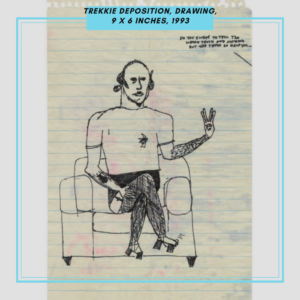
When I look back at my younger self, that sweet kid that liked to sew with mom, who had no idea what was coming their way, no language or support for what was happening to them…I get really sad and feel an incredible loss. The loss of a childhood. And to think it was all spun so well that I thought something was terribly wrong with me.
Now, that sadness turns to anger as I watch people, corporations, even my home state of Ohio, wage war on trans rights (as well as the rights of many others). That sadness turns to rage as I watch the stripping away of the tools, education, and medical care that kids and their families need in order to comprehend who they are and survive.
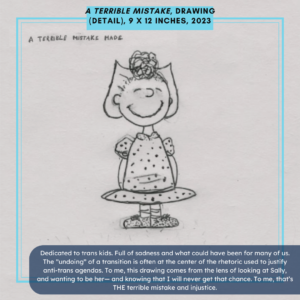
I’m sure it’s not easy to be a trans kid today, but I never had the chance to find out for myself, and the alternative wasn’t so easy for me, either. I’m still doing my daily drawing practice, and I funnel all of my sadness and anger and rage and grief into my art where I can turn it into strength, hope, and self-affirmation. Deep down, I know
these are the things that I need, and I’m now receiving, so that I can continue my journey, and hopefully help others continue theirs.
So yeah, in that sense I am truly thankful.
See more of K’s work on their website: https://www.kpontuti.com/



 became immersed in my imagination through making things. I taught myself to draw by copying my favorite comics – Charlie Brown and Snoopy were top billed in my cast of characters – and some of my fondest childhood memories are of sewing and crafting with my mom. Soon, though, I was steered towards building model cars and airplanes…“boy stuff.” (My sisters’) Barbies were replaced with G.I. Joes.
became immersed in my imagination through making things. I taught myself to draw by copying my favorite comics – Charlie Brown and Snoopy were top billed in my cast of characters – and some of my fondest childhood memories are of sewing and crafting with my mom. Soon, though, I was steered towards building model cars and airplanes…“boy stuff.” (My sisters’) Barbies were replaced with G.I. Joes. dysphoria manifesting as eating disorders, self-medication, over exercising, and an insatiable drive to prove that I was worth something, I must have known subconsciously that someday this this slimy, hairy, shitball-of-a-person inside of me would be exposed—and I’d have to come to terms with it all.
dysphoria manifesting as eating disorders, self-medication, over exercising, and an insatiable drive to prove that I was worth something, I must have known subconsciously that someday this this slimy, hairy, shitball-of-a-person inside of me would be exposed—and I’d have to come to terms with it all. through old ones. Doing more therapy…and lots of shopp
through old ones. Doing more therapy…and lots of shopp


 Alicia Sainz Arballo is a transgender woman who started her medical transition at the age of 62 years old. She is a life long educator who worked for the Los Angeles Unified School district as a counselor and teacher for 36 years. She facilitated her school’s GSA club and provided teachers with professional developments to better navigate the needs of her school’s LGBTQIA+ community. She is also a musician, playing guitar since the age of six, and poet, recently participating in the “My Life is Poetry” workshop through Los Angeles LGBTQ center, and is working at publishing a chapbook on her coming out process. She holds a Bachelor of Arts in Music from California State University Northridge, and a Masters in Counseling from California Lutheran University. She continues to advocate for trans affirming health care for all ages.
Alicia Sainz Arballo is a transgender woman who started her medical transition at the age of 62 years old. She is a life long educator who worked for the Los Angeles Unified School district as a counselor and teacher for 36 years. She facilitated her school’s GSA club and provided teachers with professional developments to better navigate the needs of her school’s LGBTQIA+ community. She is also a musician, playing guitar since the age of six, and poet, recently participating in the “My Life is Poetry” workshop through Los Angeles LGBTQ center, and is working at publishing a chapbook on her coming out process. She holds a Bachelor of Arts in Music from California State University Northridge, and a Masters in Counseling from California Lutheran University. She continues to advocate for trans affirming health care for all ages.